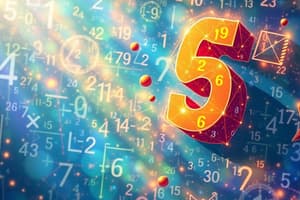Podcast
Questions and Answers
What does descriptive statistics primarily focus on?
What does descriptive statistics primarily focus on?
- Summarizing data using measures of central tendency and dispersion (correct)
- Drawing conclusions about a population from samples
- Assessing theoretical frameworks of risk analysis
- Collecting and interpreting qualitative data
Which branch of mathematics is primarily concerned with discrete structures?
Which branch of mathematics is primarily concerned with discrete structures?
- Continuous mathematics
- Calculus
- Discrete mathematics (correct)
- Differential equations
What does inferential statistics allow researchers to do?
What does inferential statistics allow researchers to do?
- Organize data in a comprehensive manner
- Summarize data with central measures
- Draw conclusions about a population based on a sample (correct)
- Analyze a complete population
What is the primary function of mathematical logic?
What is the primary function of mathematical logic?
Which area of mathematics is a key component in computer science?
Which area of mathematics is a key component in computer science?
Which type of number includes both rational and irrational numbers?
Which type of number includes both rational and irrational numbers?
What does the commutative property relate to?
What does the commutative property relate to?
What is the primary focus of geometry?
What is the primary focus of geometry?
Which operation is NOT one of the basic arithmetic operations?
Which operation is NOT one of the basic arithmetic operations?
What are the core components of solving equations in algebra?
What are the core components of solving equations in algebra?
What does differential calculus primarily focus on?
What does differential calculus primarily focus on?
What do geometric transformations include?
What do geometric transformations include?
What is the application of arithmetic in daily life?
What is the application of arithmetic in daily life?
Flashcards
Descriptive Statistics
Descriptive Statistics
Summarizing data using measures like mean, median, and range.
Inferential Statistics
Inferential Statistics
Drawing conclusions about a population from a sample.
Discrete Mathematics
Discrete Mathematics
Focuses on countable sets and structures.
Mathematical Logic
Mathematical Logic
Signup and view all the flashcards
Probability
Probability
Signup and view all the flashcards
Mathematics
Mathematics
Signup and view all the flashcards
Arithmetic
Arithmetic
Signup and view all the flashcards
Algebra
Algebra
Signup and view all the flashcards
Geometry
Geometry
Signup and view all the flashcards
Calculus
Calculus
Signup and view all the flashcards
Numbers
Numbers
Signup and view all the flashcards
Mathematical Operations
Mathematical Operations
Signup and view all the flashcards
Problem Solving
Problem Solving
Signup and view all the flashcards
Study Notes
Fundamental Concepts
- Mathematics encompasses a broad range of subjects, including arithmetic, algebra, geometry, calculus, and statistics. These areas build upon each other, with more complex concepts often reliant on the understanding of simpler ones.
- Numbers: Mathematics utilizes various types of numbers, including natural numbers (positive integers), whole numbers (non-negative integers), integers, rational numbers (fractions), irrational numbers (non-repeating decimals), and real numbers (combining rational and irrational numbers). Complex numbers extend the number system further.
- Operations: Basic mathematical operations like addition, subtraction, multiplication, and division form the foundation of more advanced calculations. Understanding these operations is crucial in problem-solving.
- Patterns and Relationships: Mathematics identifies patterns and relationships between numbers, shapes, and other mathematical objects. Discovering these patterns allows for generalization and prediction.
- Problem-solving: A key aspect of mathematics involves applying mathematical concepts to solve real-world problems. Logical reasoning and problem-solving skills are vital for success.
Arithmetic
- Arithmetic focuses on basic operations with numbers.
- Properties like commutativity, associativity, and distributivity govern how these operations interact with each other, simplifying calculations and manipulating expressions.
- Applications of arithmetic are found in daily life for tasks such as budgeting, measurements, and calculations.
Algebra
- Algebra uses letters and symbols to represent unknown quantities.
- Equations and inequalities express relationships between variables and constants.
- Solving equations involves finding the values of variables that satisfy the equation.
- Symbolic manipulation and formula derivations are core to algebra.
Geometry
- Geometry studies shapes, sizes, and positions of figures in space.
- Concepts include points, lines, planes, angles, and various 2-D and 3-D shapes such as triangles, circles, cubes, and spheres.
- Formulas for area, perimeter, volume, and surface area are key parts of geometry.
- Geometric transformations (translations, rotations, reflections) are also significant aspects within this area.
Calculus
- Calculus deals with change and motion.
- Differential calculus examines rates of change (derivatives).
- Integral calculus finds accumulated quantities (integrals).
- Applications in physics, engineering, and economics deal with problems about motion and change.
Statistics
- Statistics involves collecting, organizing, analyzing, and interpreting data.
- Descriptive statistics summarizes data using measures of central tendency (mean, median, mode) and dispersion (range, standard deviation).
- Inferential statistics allows drawing conclusions about a population based on a sample.
- Probability is the theoretical framework for statistical analysis and risk assessment.
Discrete Mathematics
- Discrete mathematics focuses on countable (discrete) sets or structures.
- Combinatorics, graph theory, and logic are crucial parts of discrete maths.
- These concepts are widely applied in computer science, particularly in algorithms and data structures.
Mathematical Logic
- Mathematical logic develops formal systems for reasoning.
- Statements, premises, and conclusions are examined to determine validity and soundness of arguments.
- Symbolic logic uses symbols and rules to represent and manipulate arguments.
- Mathematical proofs and arguments rely on logical reasoning.
Studying That Suits You
Use AI to generate personalized quizzes and flashcards to suit your learning preferences.




